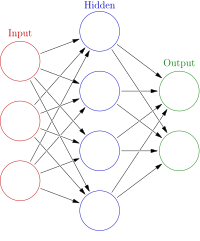
Photo from wikipedia
In this paper, differential games with incomplete information, or Bayesian games, are formulated for multiagent continuous-time dynamical systems in a communication graph. These new Bayesian graphical games model the situation… Click to show full abstract
In this paper, differential games with incomplete information, or Bayesian games, are formulated for multiagent continuous-time dynamical systems in a communication graph. These new Bayesian graphical games model the situation where the agents are uncertain about their actual payoff functions and must employ the evidence observed from the behavior of other agents to improve their estimation of the real setting of their environment. Two different solutions are proposed for the game. First, the agents play their best response strategies with respect to the policies of their neighbors; then, the agents prepare themselves for the worst-case neighbor policies. A tight relationship between the beliefs of an agent and its distributed control policy is established. Two belief update methodologies are proposed for the agents to review their strategies using information obtained from the graph topology.
Journal Title: IEEE Transactions on Control of Network Systems
Year Published: 2020
Link to full text (if available)
Share on Social Media: Sign Up to like & get
recommendations!